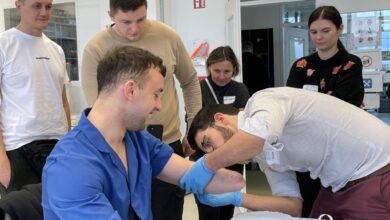

MELBOURNE, Australia — A group of scientists at the Royal Melbourne Institute of Technology, Australia, have developed a new Artificial Intelligence (AI) technology that helps in the early detection of prostate cancer in men.
The technology provides incidental detection through routine computed tomography (CT) scans.
The research was published in the Scientific Reports journal in April. The tech, developed in collaboration with clinicians at St Vincent’s Hospital Melbourne, works by analyzing CT scans for tell-tale signs of prostate cancer, something even a well-trained human eye struggles to do.
CT imaging is not suitable for regular cancer screening because of the high radiation doses involved, but the AI solution could be used to run a cancer check whenever men have their abdomen or pelvis scanned for other issues.
Prostate cancer is a leading cause of death by cancer in Australian men and is the most diagnosed form of the disease.
Recently researchers developed an AI-powered diagnostic tool that spots asymptomatic prostate cancer in seconds. The World Cancer Research Fund states that prostate cancer is the second most commonly occurring cancer in men.
“CT scans were great for detecting bone and joint problems, but even radiologists struggled to spot prostate cancers on the images,” Ruwan Tennakoon, one of the researchers in the study, said.
“We’ve trained our software to see what the human eye can’t, with the aim of spotting prostate cancer through incidental detection. It’s like training a sniffer dog — we can teach the AI to see things that we can’t with our own eyes, in the same way, a dog can smell things human noses can’t.”
For the study, researchers from the Royal Melbourne Institute of Technology and St Vincent’s Hospital Melbourne studied CT scans of asymptomatic patients with and without prostate cancer.
The team trained the AI software to look for features of the disease in a variety of scans and where exactly to look for them, avoiding the need to manually crop the images.
The AI performed better than radiologists who viewed the same images, detecting cancerous growths in just seconds. The AI was able to provide improved results with each scan, learning and adapting to read images from different machines to spot even the smallest irregularities.
“The study demonstrated how AI can and should be used to create the public good,” John Thangarajah, head of AI at the Royal Melbourne Institute of Technology, said.
“Our health sector needs smarter solutions, and AI can help, but we’re only scratching the surface. There’s a lot of good that artificial intelligence can bring to the world, which is our focus at RMIT, and this study forms a big part of that.”
Mark Page, head of CT in Diagnostic Imaging at St Vincent’s Hospital Melbourne, said early intervention for prostate cancer was key to a better health outcome.
“Australia doesn’t have a screening program for prostate cancer but armed with this technology, we hope to catch cases early in patients who are scanned for other reasons,” Page said.
“For example, emergency patients who have CT scans could be simultaneously screened for prostate cancer. If we can detect it earlier and refer them to specialist care faster, this could make a significant difference to their prognosis,” he said.
Researchers at the Royal Melbourne Institute of Technology also developed a technology recently that could hear a cough and detect Covid-19, even when the patient is asymptomatic.
The technology can be applied at scale, potentially integrating with a variety of diagnostic imaging equipment like MRI and DEXA machines — pending further research.
The multi-disciplinary team is also looking for interested commercial partners to develop software to further integrate the AI tech with hospital equipment for possible clinical trials.
(With inputs from ANI)
(Edited by Abinaya Vijayaraghavan and Praveen Pramod Tewari)
The post Australian Researchers Develop AI Tech For Early Detection Of Prostate Cancer appeared first on Zenger News.





